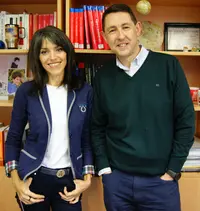Saturday, 28th September, 9.30-10.30

Javier Pérez-Guerra and Elena Seoane
Javier Pérez-Guerra and Elena Seoane are Professors of English Linguistics at the University of Vigo, and belong to the research group Language Variation and Textual Categorization (LVTC, https://lvtc.uvigo.es/). They both received their PhDs in English Historical Linguistics from the University of Santiago de Compostela, and their research has focused on corpus-based morphosyntactic variation and change in the history of English and in current World Englishes. They have explored a variety of topics, mainly related to information-structure strategies, such as passive voice, left/right dislocation, topicalization, extraposition and existential sentences, and their research has led to the publication of a large number of peer-reviewed papers and the editing of over a dozen books, as well as the coordination of several nationally and internationally-funded competitive research projects. They have organised various international conferences (ICEHL11 2000 and NRG3 2005 in Santiago, Englishes Today 2013 and BICLCE7 2017 in Vigo, among others). They also serve in the editorial teams of Folia Linguistica and English Language and Linguistics and are involved in the compilation of spoken and written corpora, such as ICE-GBR (the Gibraltar component of the International Corpus of English) and VICOLSE. This is their first joint piece of research.
Comparative variation in World Englishes: New, (more) newer determinants?
Variation in the formation of comparatives is a well-researched area (see S?ily et al. 2018 for a summary of the literature). Studies have shed light on the phonological, syntactic and frequency factors that determine the variation between synthetic easier and analytic more easy, uncovering an intricate interplay of forces, the strength of which can only be measured and validated statistically. In our study we introduce a third variant, more easier, looking specifically at L2 or Outer Circle varieties of English. The potential variation observed in these varieties is especially relevant because (i) they often exhibit traits of earlier forms of English, their original input language, bearing in mind that until the 18th century the synthetic and analytic forms were freely interchangeable and that the form more easier was often attested (Lass 1999: 157-158; González-Díaz 2008); (ii) L2s tend to use more transparent and isomorphic forms, and this could tilt the balance towards a relatively more frequent use of analytic forms. In this presentation we will describe a multivariable analysis of examples of synthetic, analytic and double comparatives in a selection of L2 varieties, in an attempt to discern, on the one hand, the most significant (formal) factors that determine comparative variation in contemporary Englishes (among them, syllable length, endings, syntactic position, presence of pre/post-head dependents and second terms of comparison, complexity status of the phrase ? as in Mondorf 2009), and, on the other hand, discuss the consequences of our findings for derivation/inflection traits, in particular in L2 contexts (e.g. Bauer 2004).
References
Bauer, Laurie. 2004. The function of word-formation and the inflection-derivation distinction. In Words in their places. A Festschrift for J. Lachlan Mackenzie, eds. Henk Aertsen, Mike Hannay and Rod Lyall. Amsterdam: Vrjie Universiteit, 283?292.
González-Díaz, Victorina. 2008. English adjective comparison: a historical perspective. Amsterdam: John Benjamins.
Lass, Roger. 1999. Phonology and morphology. In The Cambridge history of the English language III 1476-1776, ed. Roger Lass. Cambridge: CUP, 56?186.
Mondorf, Britta. 2009. More support for more-support. The role of processing constraints on the choice between synthetic and analytic comparative forms. Amsterdam: John Benjamins.
S?ily, Tanja, Victorina González-Díaz and Jukka Suomela. 2018. Variation in the productivity of adjective comparison in Present-Day English. In Corpus approaches to contemporary British speech. Sociolinguistic studies of the Spoken BNC2014, eds. Vaclav Brezina, Robbbie Love and Karin Aijmer. New York: Routledge, 159?184.
